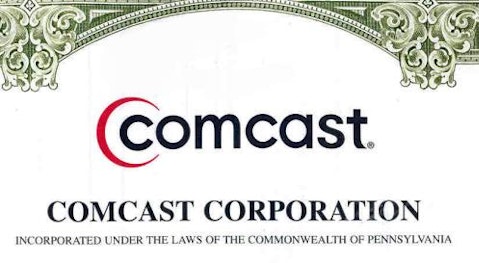Much to the chagrin of couch potatoes everywhere, there are plenty of reasons to be sour about Comcast Corp. (NASDAQ:CMCSA), the largest cable provider in the United States. In addition to TV, the company is also a prominent supplier of Internet and telephone services to media-hungry consumers. In recent months, knowledgeable shareholders of CMCSA – corporate insiders and hedge funds – have been bearish on the stock, even though it has consistently yielded a positive return since the most recent recession. In fact, over the last three years, shares of Comcast have almost tripled in value and currently rest around $30 a share. Though this stock has been booming, there are fundamental reasons why it is not unreasonable to expect that CMCSA shares have hit their peak.
In the last two months, there has been a flourishing of selling activity from officers employed by Comcast. Specifically, L. David Cohen, J. Lawrence Salva, L. Brian Roberts, M. Sheldon Bonovitz, R. Arthur Block, Neil Smit, and B. Stephen Burke are the insiders that have elected to reduce their holdings of CMCSA. In total, these seven officers have sold 841,922 shares for a total value of nearly $24 million. Over this same time period, there have been zero insider purchases of any kind. The hedge fund industry further exemplifies this bearish trend. At the end of the third quarter of 2011, 73 funds held long positions or call options on the stock. By the end of the next quarter this number shrank to 62, and of the 17 hedge funds that held at least 2 percent of their holdings in CMCSA stock, only 5 elected not to downsize their positions. Notable funds that decreased holdings were Eagle Capital Management, Ivory Capital, Kensico Capital, and Senator Investment Group.
This selling behavior is supported by the stock’s fundamentals, giving weight to the saying: “past performance is not indicative of future results.” The first analysis we will perform is through peer comparison of Forward Price-to-Earnings ratios. Now, Forward P/E ratios can give us the expected value that investors will place on each dollar of earnings, and CMCSA’s is 13.8. Looking at its competitors we can see AT&T Inc. (NYSE:T) at 12.1, Verizon (NYSE:VZ) at 13.4, DIRECTV, Inc. (NASDAQ:DTV) at 9.5, and DISH Network Corp. (NASDAQ:DISH) at 11.4, meaning that CMCSA is slightly overvalued when looking at this metric. Due to the fact that Comcast and these competitors are mature companies, it is also worth comparing Price-to-Sales ratios. The reasoning behind this ratio is the exact same as the P/E ratio, though it measures how investors value each dollar of sales. CMCSA’s P/S ratio is 1.5, while we have T at 1.5, VZ at 1.0, DTV at 1.4, and DISH at 1.1. Once again, this suggests that in comparison to other companies in its industry, CMCSA is an overvalued stock.
Aside from these valuation red flags, there are a few macroeconomic risks that have adversely affected investor sentiment in recent months. The company has reported that they are seeing subscriber growth plateau, and expect it to begin to decline over the next year. Reasons for this slowdown in customer accumulation have been attributed to a wide range of factors including: market saturation, higher programming costs, price competition, and cheaper alternative technologies. It is plausible that insiders are the most aware of these risks, which may explain the aforementioned selling frenzy. Additionally, it is also reasonable to expect that hedge funds have accurately taken CMCSA’s overvaluation into account in their bearish actions, so the combination of these two factors makes Comcast Corp. (CMCSA) a sell.



